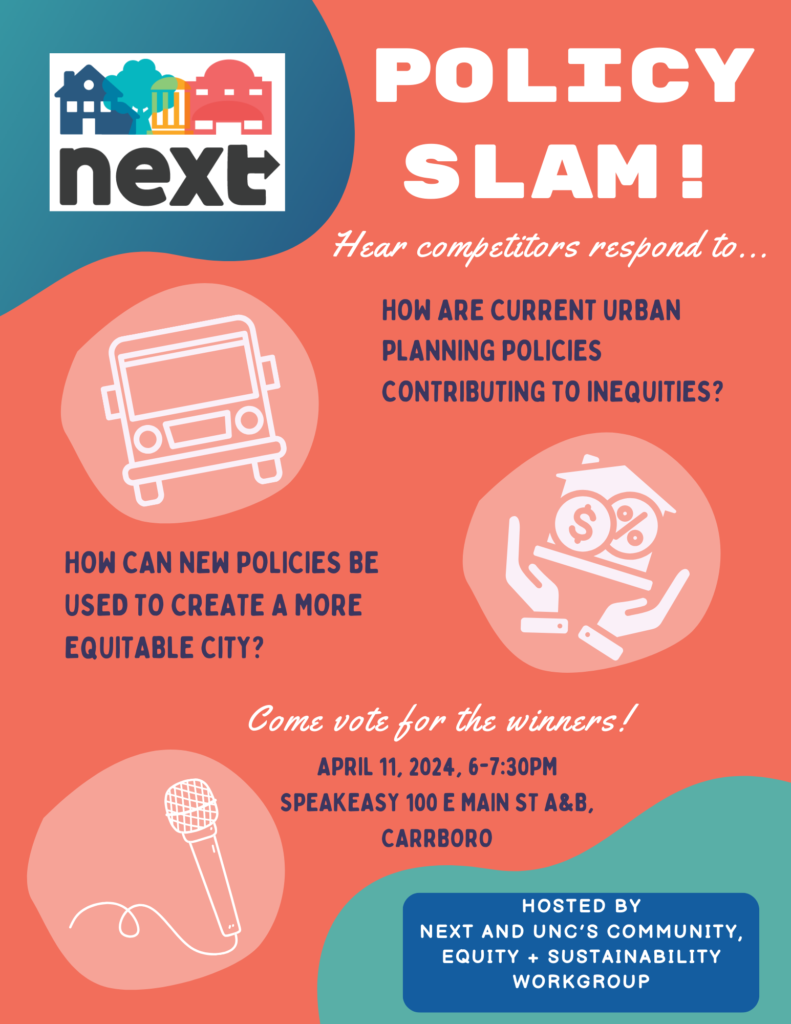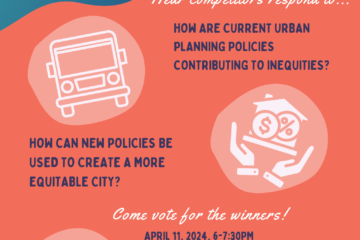
Policy Slam “Lightning Talk” Competition
CLOSED FOR ENTRIES
Mark your calendar for the competition on
Thursday, April 11th at 6pm at the Speakeasy in Carrboro.

Do you have ideas for making Chapel Hill and Carrboro a more equitable and inclusive community? Then we have the competition for you!
DEADLINE TO ENTER: Monday, March 4th, 2024
First Prize: $300
Second Prize: $150
Third Prize: $50
PURPOSE: The purpose of a policy slam “lightning talk” competition is to highlight a policy proposal or solution through engaging and informative communication. This is a platform to share your ideas for improving programs and policies related to city planning. Not only will you help create important community discussion, but you can also win prize money.
PROMPT: How are current urban planning policies contributing to inequities and how can new policies be used to create a more equitable city? Examples of existing policies include free parking, parking minimums, highway widening, transit-oriented development, and zoning policy.
TO ENTER: Create a 1-minute video pitch (MP4, PowerPoint etc.) presenting your idea and how it will address current inequities or advance equity in city planning policies. Your pitch should briefly summarize your idea by introducing the key issue you will be addressing and the proposed solution(s), as well as explaining the importance. All entrants will be scored based on the criteria below. Five entrants will be selected to deliver their Lightening Talk for a chance to win a cash prize. At the event, audience members will vote for the winners of first and second place in the competition.
LIGHTING PRESENTATION FORMAT: If selected to present your idea, you will have 5 minutes to deliver your talk to a general audience using visual aids (ex. PowerPoint slides), generally following this format: Introduction, Problem, Proposed Solution(s), and Conclusions. You should use communication strategies that engage the audience (tell your story), generate critical discussion, and inspire change (call to action). Include visuals and research/data to convince your audience.
Consider the following format:
• Slide 1: Introduction. Who you are and your affiliation/identity.
• Slide 2: Problem statement. Describe the policy problem in 1 full and complete sentence (not just keywords), focusing on where we should be going rather than where we’ve come from. Provide brief examples of why this issue is important to society, communities, and individuals/families. We recommend that you integrate visuals, research, and data! Convey your own passion for this issue and frame the problem around values.
• Slide 3-4: Proposed Solutions. Describe the practice/policy context and solution you are proposing. Explain in terms that relate to real experiences. As needed, use metaphors, analogies, or simpler processes that help non-experts understand your issue area. Use visuals! Avoid jargon!
• Slide 5: Conclusions and implications. Deliver the “so what”? Provide specific, directive language about what should change at the practice, program, or policy level to advance equity.
STYLE: You want to be prepared, professional, and passionate. You also want to be clear, calm, and convincing. To accomplish these goals, the packaging of your presentation is as important as your contents. This means you should practice and think about how you are presenting as much as what you are presenting.
Tips for practicing:
• Smile and breathe, speak slowly, take pauses between key points
• Keep the focus on you and the audience, not the slides. Remove clutter and limit words on your slides. Do not look at the slides at all (this takes practice).
• Get to the point quickly and concisely, easy words are better, simplify graphics, no blocks of text
• Easy access (the more you put on a slide, the less people will take from the slide)
• Visual experiences more than reading experiences (prioritize graphics/images + essential text)
• Clear structure (provide clear titles and take-aways on all content slides)
• All ‘Value Add’ (stay away from silly images/effects; don’t have slides which just say “Thanks!” or any other self-evident thing)
ELIGIBILITY AND SELECTION CRITERIA: This contest is open to ALL, including university students of all levels and community members. Entrants in this contest will be assessed based upon originality, potential impact of the proposed policy, clarity of expression, and quality of research cited to support your proposal.
SUBMISSIONS: You can email your entry to: nextncfwd@gmail.com. Questions? Contact Molly De Marco at mollydemarco@gmail.com.
DEADLINE TO ENTER: Monday, March 4th, 2024
***Lightning Presentation date, time and location will be announced along with the five presenters.
RESOURCES: Simple searching for “Ted Talk tips” will generate lots of mostly good advice and suggestions for how to communicate effectively. Also, there are now many resources related to the “3 Minute Thesis” that are also useful:
• http://gradprofdev.web.unc.edu/3-minute-thesis/
• http://www.apa.org/monitor/2017/02/tips-speaking.aspx
• https://blog.ted.com/12-pieces-of-advice-for-giving-talks-that-have-impact/


0 Comments